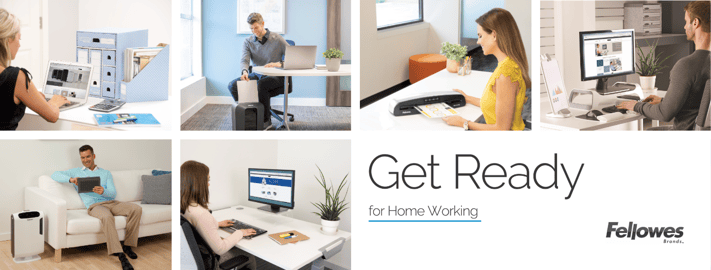
Employers may be concerned about the challenges of managing a team of employees working from home.
Without preparing for a dispersed workforce, there can be risks of lower productivity, reduced security and inadequate health and wellbeing support.
You need the right policies and equipment in place to prevent these problems. When these steps are taken, dispersed working can be a big success.
Travel agency Ctrip carried out a trial where half their people worked from home for nine months apart from one day a week. The other half were office-based.
Over two years researchers tracked a 13% improvement in performance from people at home. There were 50% less resignations from these employees, resulting in big savings in recruitment and training.
Employers can set businesses up to succeed by preparing in three areas - communication, security and wellbeing.
1. Communicating
You may need a remote working policy to make sure everyone is on the same wavelength when it comes to communicating, protecting data and equipment and meeting legal requirements.
One study found that 63% of companies have remote workers but more than half of these (57%) do not have a remote working policy.
This could include:
- The need to work in a quiet, distraction free environment
- Confirmation that internet connection is adequate
- Paying full attention to job during work hours
- Communicating through agreed channels
- Daily activity updates on shared folders
- Abiding by data protection, confidentiality and other employment policies
- Care of company assets
- Insurance requirements for using company equipment
Communication when working remotely matters. In fact, it was the biggest answer of 38 remote companies when they were asked how they win at home working.
Most of these businesses use collaboration tools such as Slack, Zoom, Google Hangouts and Skype for co-workers to stay in touch and ensure projects are running on time.
Home workers also want to be kept up to speed on business developments. In one remote employee survey, 39% of people saw lack of information from management as the biggest obstacle. Another 38% raised timeliness of information as their main issue.
One way to keep everyone on track is through 15-minute video-calls between teams each morning, similar to the stand-up meetings of agile working. These allow each team member to briefly say what they did yesterday, what they plan to do today and if they see any impediments.
2. Security
Your business may already have a virtual private network (VPN) for encrypted connections between employee computers and the IT system. If you are potentially increasing the number of employees using the VPN at once, you may need to buy more user licences or improve your server capacity.
But data security and compliance with GDPR goes beyond this.
Employees at home need to safely manage their disposal of paperwork, and the safe storage of documents.
Anyone using personal or confidential paperwork will need to use a desk-side cross-cut shredder to securely dispose of documents containing personal data, when these are no longer needed.
Personal data is any information that identifies an individual, whether a customer, client, employee or associate. Anything that can identify someone fits in this category, including photos, names, addresses, phone numbers, transactions or social media activity.
If people need to store work documents, particularly confidential ones, at home, these should be kept safe in storage boxes with lids, or transfer files.
Paperwork left lying around at home has the potential to lead to a data breach, and home filing and storage reduces this risk.
3. Wellbeing
One factor that shouldn’t be overlooked when people are working away from the office is health and wellbeing.
The ROI of ergonomics shows that when you give employees the tools and accessories to work comfortably, they are happier and more productive. It’s good for business.
It’s important to make sure that your wellbeing policy carries through into the home environment because musculoskeletal disorders are one of the most common causes of disability, sick leave and early retirement.
Workstation risk assessments are a legal requirement under EU Directive 90/270/EEC. They help to keep absence down and productivity up, and they should be carried out by each employee when they switch to home-based working. If a person needs ergonomic accessories to help them sit ergonomically at work, from footrests to monitor risers, these should be provided for home working too.
By endorsing good communication, security and wellbeing, your actions will help a distributed workforce become a successful one.
Written by Fellowes
With Banner you can...
With Banner you can overcome the challenges of managing a team of employees working from home. For product ideas, view our Working From Home Survival Guide here.
Procurement Insights: For more insights join Banner on LinkedIn or follow us on Twitter
Sources:
- Travel agency remote working study: https://www.gsb.stanford.edu/insights/why-working-home-future-looking-technology
- Communication for remote companies: https://blog.proven.com/remote-work
- Remote employee survey/information: https://lp.servicemax.com/rs/020-PCR-876/images/WP-Zinc-Communication_Trends_Across_Deskless_Workers.pdf
- Stand up meetings: https://www.atlassian.com/agile/scrum/standups
- Remote working policy: https://www.slideshare.net/upwork/2018-future-workforce-report-hiring-manager-insights-on-flexible-and-remote-work-trends/1

